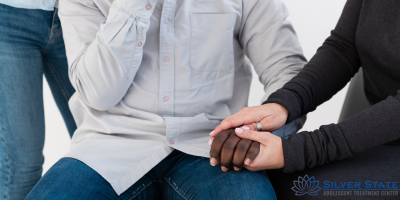Teen Drug Rehab Services for Marijuana Dependency and Mood Shifts

Table of Contents
Key Takeaways
- Teen drug rehab serviceshelp young people safely break free from marijuana use.
- Mood swings caused by marijuana are real and can profoundly affect a teen’s daily life.
- Rehabilitation teaches individuals better ways to cope, think, and manage their emotions.
- Involving the family in treatment builds trust and improves communication.
- Starting early prevents future emotional pain and risky behaviors.
- Even teens who “seem fine” may still need help with hidden struggles.
Introduction
For a lot of teens, trying marijuana might feel like no big deal at first. But what happens when it becomes more than just trying something new? What if your teen starts using it frequently, and their moods, sleep patterns, energy levels, and personality begin to change? You might notice them pulling away, getting angry quickly, or just not acting like the kid you used to know. These changes aren’t just part of “growing up.” Sometimes, they are signs that your teen is dealing with marijuana dependency and struggling to handle their emotions. This is where teen drug rehab services can make a difference. Rehab isn’t about punishment, it’s about healing, support, and growth. It helps teens get to the root of their feelings and gives them tools to build a stronger, healthier future.
Why Is Marijuana Use a Bigger Risk for Teens?
Teenagers’ brains are still developing, especially in the areas that control emotions, decision-making, and choice. According to the CDC, marijuana can interfere with this process. Regular use can lead to:
- Trouble focusing or remembering things
- Feeling anxious or depressed
- Low motivation or energy
- Trouble sleeping or managing stress
When teens turn to marijuana to deal with pressure or pain, it can quickly turn into teen substance use disorder, a pattern that becomes harder to break over time.
How Does Marijuana Affect Mood?
At first, marijuana might seem like a way to relax or “feel better.” However, over time, it can have the opposite effect. Many teens start to feel anxious, easily irritated, or emotionally flat when they’re not high. A study from PMC found that marijuana messes with how the brain handles pleasure and emotion. This can cause teens to lose interest in things they once loved, such as sports, music, or spending time with friends. You may see them withdrawing or acting like they don’t care. But deep down, they’re likely feeling stuck and unsure of how to ask for help.
How Can You Tell When a Teen Needs Help?
Every teen is different, but here are some common warning signs:
- Mood swings or a quick temper
- Lying or sneaking around
- Bad grades or skipping school
- Avoiding family or old friends
- Smelling like marijuana or finding drug paraphernalia
These signs don’t mean your child is “bad”; they suggest they might be in pain. And pain, when left untreated, often gets worse.
What Happens During Teen Drug Rehab?
Teen-focused rehab centers are made just for young people. They’re safe, structured spaces where teens can learn about themselves and why they’re using. At Silver State Adolescent Treatment Center, teens get support in a setting that understands their world. They learn how to:
- Cope with stress in healthy ways
- Recognize emotions and triggers.
- Rebuild confidence and motivation.
- Talk openly about what they’re feeling.
If your teen is showing deeper emotional signs like sadness or self-harming thoughts, we also offer specialized help through our teen suicidal ideation program.
Why Does Family Involvement Matter?
Addiction doesn’t just affect the person using; it touches everyone in the home. That’s why our plays a significant role in what we do. In family therapy, everyone gets a chance to:
- Talk honestly and openly
- Heal past misunderstandings
- Learn how to support recovery.
- Rebuild trust together
When families are involved, teens feel less isolated and more motivated to persevere.
How Does Rehab Help With Mood Swings?
Marijuana can throw off a teen’s emotions. They might feel fine one minute and overwhelmed the next. In rehab, therapists help teens understand these emotional ups and downs and show them how to manage them without turning to substances. Using techniques like Cognitive Behavioral Therapy (CBT), teens learn to:
- Pause before reacting
- Talk through what they feel
- Replace unhealthy habits with better ones.
- Recognize when they’re getting off track.
This gives teens confidence and control they might not have had in a long time.
Why Early Help Is So Important
Waiting too long to get help can lead to deeper issues like depression, risky behavior, or even overdose. NIDA reports that overdose deaths in teens are rising, and marijuana use is often part of the bigger picture. You don’t have to wait until things are “bad enough.” Taking action now could protect your teen from a lot of future pain and open up a new, healthy path
What If My Teen Is High-Functioning?
Even if your teen is still getting good grades or playing sports, that doesn’t mean they’re okay. Some teens hide their stress and maintain appearances, but that doesn’t mean they aren’t struggling internally. Rehab isn’t just for teens who’ve hit rock bottom. It’s for any young person who wants to feel better, think clearer, and live free from emotional chaos.
Watch and Learn
If you want more insight into how teens act when they’re hurting, watch this powerful video: The hidden language of drug-seeking patients. It helps explain the emotional pain behind addiction and why treatment with care and understanding makes a huge difference.
Conclusion + CTA
You don’t have to go through this alone. If your teen is using marijuana and their moods are all over the place, there is real help available. Teen drug rehab services can bring your child back to themselves, and bring peace back to your family. Call <725-525-9897 to speak with someone at Silver State Adolescent Treatment Center. Let’s work together to help your teen feel better, think clearer, and move forward with strength.
What Role Do Drug Rehab Services Play in Supporting Teen Mental Health Recovery?
Drug rehab services are crucial for supporting teen mental health recovery. These programs provide a safe environment where adolescents can heal and learn coping strategies. In particular, silver state teen recovery emphasizes personalized care, addressing the unique challenges faced by teens, and fostering resilience for long-term wellness.
FAQs
Can marijuana affect a teen’s mood?
Yes. It can increase anxiety, depression, and mood swings, mainly when used often.
Will rehab mean my teen falls behind in school?
No. Many rehabilitation programs help teens stay on top of their schoolwork and even improve their focus.
What if my teen doesn’t want to go?
That’s common. A counselor can help guide the conversation and explain the benefits of the program.
Do parents get involved?
Yes. Family therapy plays a significant role in helping teens heal and stay on track.
Is rehab just for extreme cases?
Not at all. Rehab helps teens at all stages, whether it’s early use or ongoing struggles.
Resources
Cannabis and Teens: Risk Factors and Effects– Centers for Disease Control and Prevention (2024) https://www.cdc.gov/cannabis/risk-factors/cannabis-and-teens.html Unintentional Drug Overdose Death Rates Among U.S. Youth Aged 15–19 – National Institute on Drug Abuse (2023) https://nida.nih.gov/research-topics/trends-statistics/infographics/unintentional-drug-overdose-death-rates-among-us-youth-aged-15-19 Cannabis Use and Its Effects on Adolescent Brain Development – PMC/National Library of Medicine (2020) https://pmc.ncbi.nlm.nih.gov/articles/PMC7111474/


